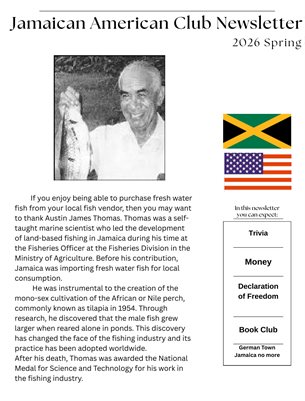Where is your Cultural Pride?
By Myrna Loy
While I was sitting distribution copies of “Blackbright Magazine” at the carnival, I noticed three noisy Black men. One of them was wearing a red, yellow and green t-shirt with the herb symbol on the front. He was holding a bottle of Remy Martin to his mouth and was gulping greedily. Another wore dreadlocks and was waving a half consumed bottle of whiskey over his head while being held around the neck by the third, who was wearing a t-shirt with the words “Jamaica – Irie Mon” on the front. If you hadn’t seen them laughing minutes before, you would thought they were fighting.
They were generally drawing attention to themselves and obviously under the influence. What infuriated me was that they were imitating Jamaican patios, wore symbols that identify them as Jamaicans when they were obviously not Jamaicans, and worse their conduct was doing Jamaicans a disservice. Even though their impersonation was poor, any non Blacks or non Jamaicans could erroneously categories them as Jamaicans. These men are what some call “Jafakans” i.e. fake Jamaicans. Their imitation of the Jamaican identity would not be so offensive if it did not negatively implicate Jamaicans, but it does! Onlooker seemed genuinely concerned of the affray. I was concerned as well, but for a different reason.
I was worried that non Blacks may not know that Africa is divided into 43 countries and there are approximately 21 Caribbean island territories, so that these men could have come from any one of them! I didn’t like the idea that if the affray was reported and descriptions were requested, “Witnessed” (being none the wiser), could easily say: “they were definitely Jamaican I could tell by their accent!” Hence the rap: “H’enting dat gwann a foreign, de yardie get the blame”. A Jamaican cannot be defined nor categorized. Jamaicans include Lord Ouseley, who is a member of the House of Lords; Delroy Lindo, who is a famous actor; Lennox Lewis, who is a World Heavy with Champion; Naomi Campbell or Tyson Beckford, who are supermodels; Patrick Ewing and Donovan Bailey, who are sportsmen; Dian Abbot, who is a Politician; Bob Marley, Busta Rhymes, Harry Belafonte, who are musicians to name a few. But for some reason, Jamaicans are seldom associated with high achievers, the famous and the infamous.
Because of biased media coverage that results in stereotyping and bigotry, the un-informed usually think of Jamaicans as trouble maker, aggressors, wear dread locks, smoke weed, sell coke and are gun- proud. As a result Jamaicans get a bad reputation and end up being apprehended (or blamed) for many criminal misdemeanors when the offence could have been committed by someone from another island or country pretending to be Jamaican. I am not sure why non Jamaicans try to implicate Jamaicans by mimicking their accent and their stance. Maybe they don’t realize that they are doing it or maybe, subconsciously, they lack cultural pride. All I can say is that if you from Africa, claim your African-ness. If you are from one of the island territories of the Caribbean- claim your true heritage. If you are born in this country (UK) – maintain your parent’s culture and don’t borrow someone else’s’. Everyone should be proud of tier heritage, their language and their culture and while “playing Jamaican” can be fun, if a non Jamaican is not behaving in a law abiding fashion yet imitation a Jamaican, they are reinforcing the negative stereotypes and making it difficult for Jamaicans to gain respect.















